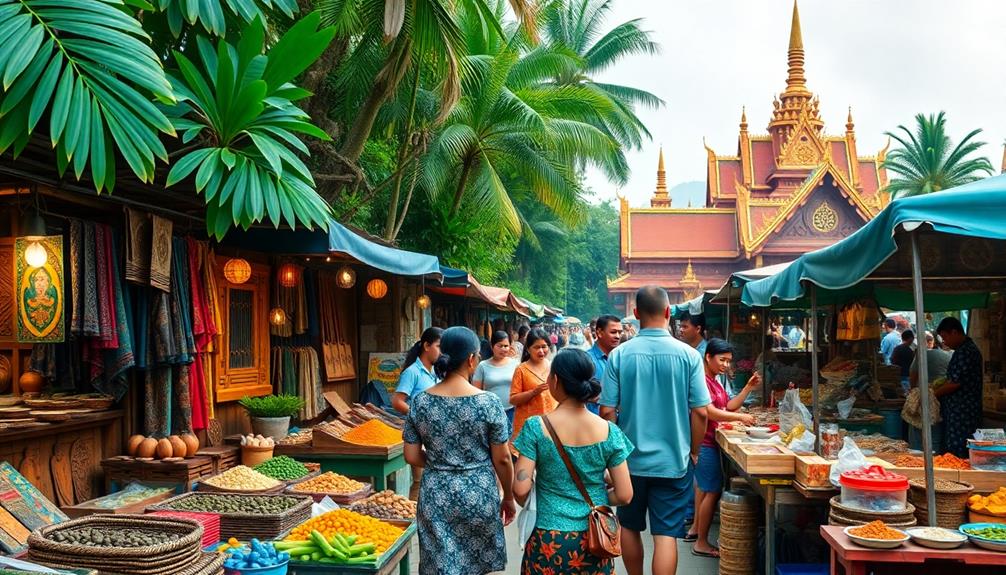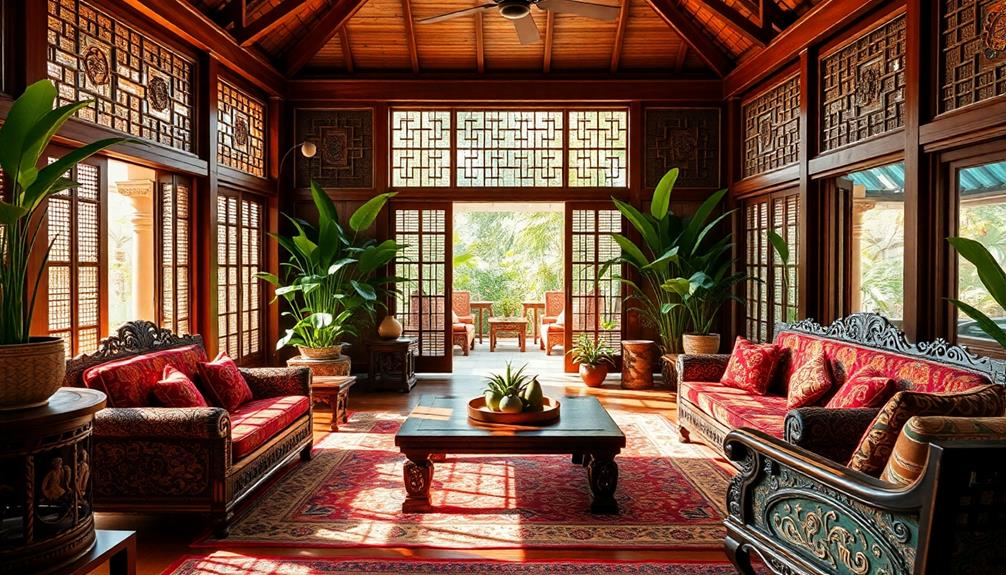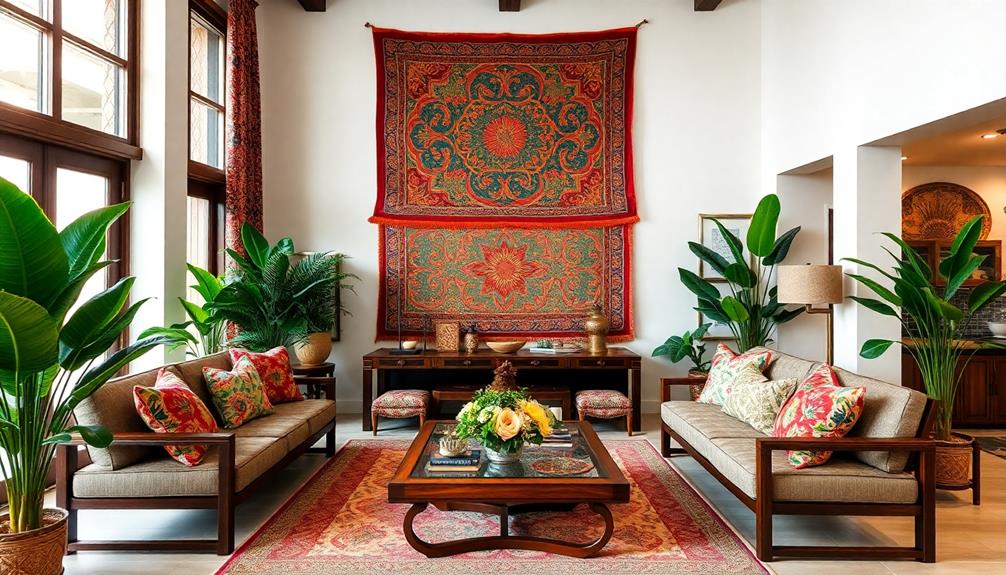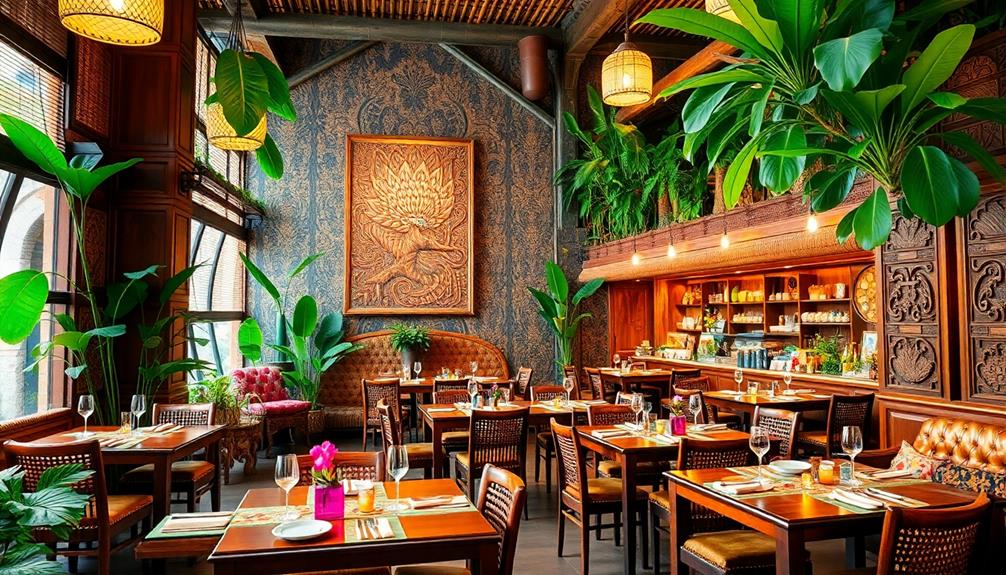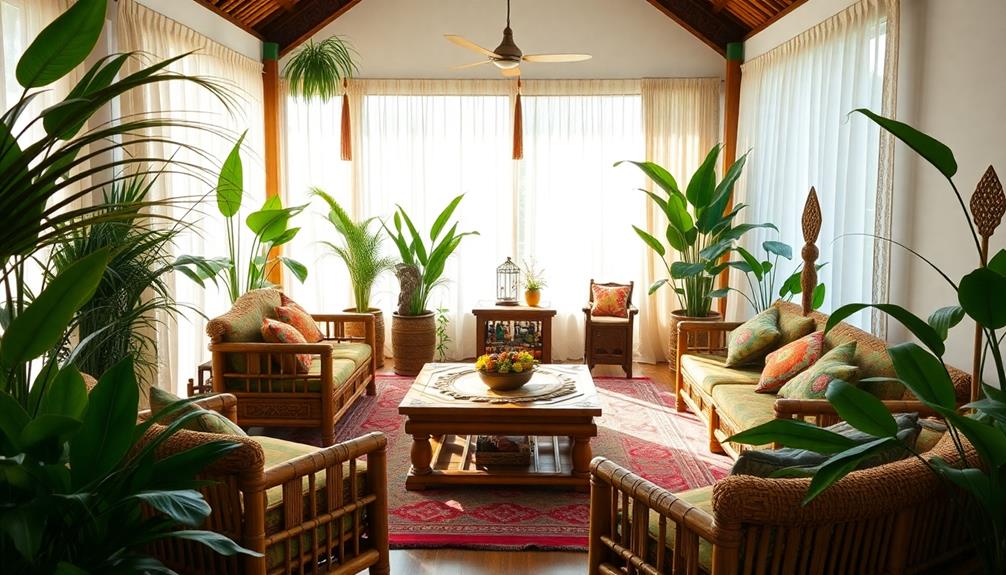Indonesians are celebrated for their stunning diversity and rich cultural tapestry. With over 300 ethnic groups and more than 700 languages spoken, the country's vibrant traditions are truly enchanting. You'll find breathtaking landscapes, from pristine beaches in Bali to lush rainforests teeming with unique wildlife like orangutans and Komodo dragons. The culinary scene is equally impressive, featuring flavors like spicy Nasi Goreng and savory Rendang. Plus, Indonesia boasts impressive historical sites like the iconic Borobudur Temple. There's so much more to discover about this fascinating country, so stick around to uncover even more surprising aspects of Indonesian life! In addition to its natural beauty and rich cultural heritage, Indonesia is also renowned for its vibrant and diverse art scene. Indonesian art decor is a unique blend of traditional and modern influences, with intricate designs and bold colors that reflect the country’s dynamic history and multicultural identity. Whether you’re exploring bustling markets for handcrafted textiles or admiring contemporary art galleries in Jakarta, there’s no shortage of artistic inspiration to be found in Indonesia.
Key Takeaways
- Indonesia is the largest archipelago in the world, comprising over 17,000 islands rich in biodiversity and unique wildlife.
- Home to over 300 ethnic groups, Indonesia boasts a rich cultural tapestry with diverse languages, traditions, and culinary delights.
- The country has significant historical significance with UNESCO World Heritage Sites like Borobudur Temple, reflecting its rich past and colonial influences.
- Indonesia is a growing economic powerhouse, ranking as the 16th largest economy globally, driven by agriculture, manufacturing, and services.
- With 442 gigawatts of renewable energy potential, Indonesia is a leader in geothermal energy production and aims to increase its renewable energy share.
Unique Biodiversity Highlights
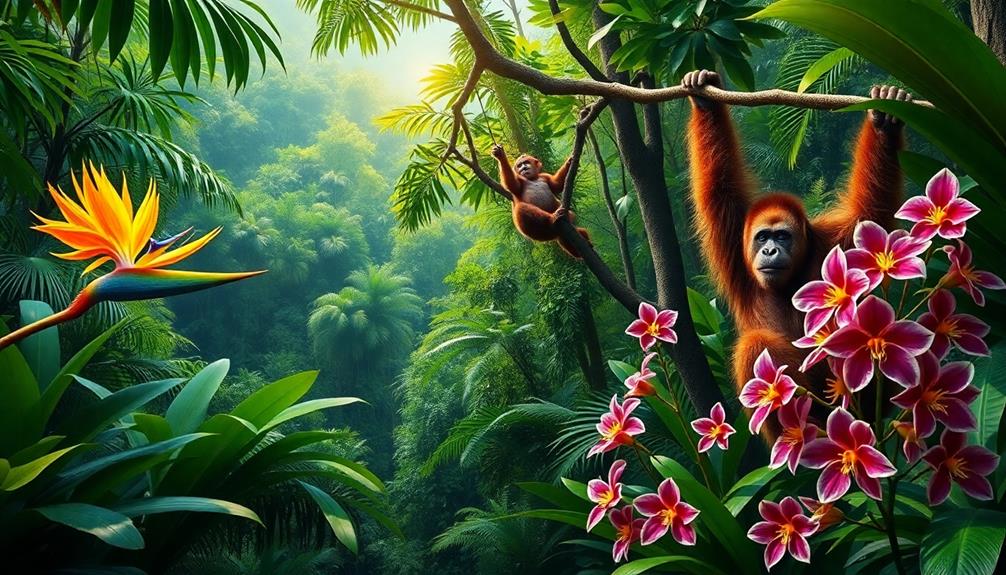
Explore the astonishing biodiversity of Indonesia, a nation that boasts over 17,000 islands and serves as the largest archipelago in the world. This incredible diversity contributes to its unique ecosystems, making it a paradise for nature lovers.
You'll discover that Indonesia is home to 10% of the world's plant species and 12% of mammal species, with many of these species often inspiring traditional Southeast Asia Decor elements. Among its treasures are endemic species like the orangutan and the Komodo dragon, which you won't find anywhere else.
Recognized as a critical biodiversity hotspot, Indonesia houses over 100 endangered species, including the majestic Sumatran tiger and the elusive Sumatran rhinoceros. The lush rainforests are among the most diverse on the planet, offering a stunning array of flora and fauna, highlighted by the Rafflesia arnoldii, the largest flower in the world.
Don't forget the vibrant marine ecosystems! Indonesia's extensive coral reefs are teeming with life, supporting a remarkable variety of marine species.
This rich biodiversity isn't just fascinating; it's essential for conservation efforts and the health of our planet. So, immerse yourself in Indonesia's unique biodiversity and appreciate what makes this archipelago truly special.
Rich Cultural Tapestry
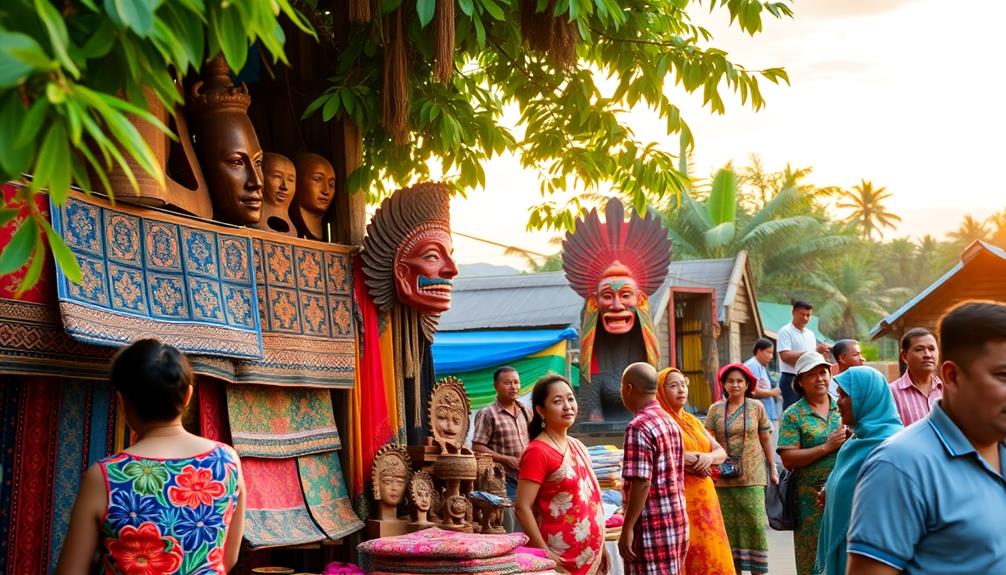
Rich Cultural Tapestry
Indonesia is a vibrant tapestry of cultures, uniquely woven together by over 300 ethnic groups that each bring their own customs and traditions. This incredible cultural diversity is evident in the rich linguistic landscape, where over 700 local languages thrive alongside Bahasa Indonesia, the official language.
You'll find that traditional arts, like Batik, not only showcase intricate craftsmanship but also reflect the deep cultural significance of Indonesian textiles, earning recognition as a UNESCO Intangible Cultural Heritage. Additionally, traditional artistry is celebrated through Indonesian decor masks, which embody local stories and customs, enhancing the aesthetic appeal of home spaces.
As you explore the country, don't miss the chance to indulge in its vast culinary heritage. Dishes like Nasi Goreng and Rendang highlight regional ingredients and cooking techniques, making every meal a unique experience.
Festivals and ceremonies, such as Nyepi and Idul Fitri, further illustrate Indonesia's cultural diversity, celebrating the blend of religious and cultural practices that define everyday life.
In Indonesia, you'll discover that each region offers something distinct, from music and dance to art and food. It's this rich cultural tapestry that makes Indonesia not just a destination, but a vibrant experience that invites you to investigate its many wonders.
Economic Growth and Potential

Indonesia's economy is booming, and you're witnessing the rise of an emerging market with incredible potential.
This growth is also reflected in the housing sector, where there are modern housing trends focusing on eco-friendly designs and smart technology integration.
As the government prioritizes infrastructure development, you can see how it's essential for supporting diverse sectors, including renewable energy.
This growth isn't just about numbers; it's about creating a sustainable future for everyone.
Emerging Market Dynamics
Southeast Asia's largest economy, Indonesia, showcases remarkable potential in the emerging market landscape. With a GDP growth rate of around 5% annually, it highlights its emerging market potential and positions itself as the 16th largest economy globally. This growth is fueled by diverse sectors, including agriculture, manufacturing, and services, which play essential roles in its economic framework.
Additionally, the rich cultural heritage of Indonesia is reflected in its vibrant Indonesian decorative pillows, adding unique charm to living spaces while supporting local artisans.
Indonesia's key exports—palm oil, coal, rubber, and textiles—significantly contribute to its economic stability and growth. These sectors not only bolster the economy but also create numerous job opportunities. As a member of the G20, Indonesia actively engages in global economic discussions, promoting initiatives aimed at sustainable development.
Looking ahead, rapid investments in infrastructure and technology are imperative for Indonesia's economic diversification. By focusing on these areas, the country aims to reduce its reliance on natural resources and foster a more balanced economic landscape.
This strategic shift underscores Indonesia's commitment to harnessing its emerging market potential, paving the way for a brighter economic future. You can see that Indonesia is on the brink of becoming a key player in the global market, making it an exciting place to watch in the coming years.
Infrastructure Development Needs
The pressing need for infrastructure development in Indonesia plays a vital role in its economic growth and potential. With Indonesia being the official 16th largest economy by GDP, maintaining a growth rate of around 5% annually requires a robust infrastructure framework.
Approximately 56% of the population lives in urban areas, which amplifies the demand for improved transportation, utilities, and housing. In addition, the integration of modern materials in infrastructure projects can enhance durability and sustainability, reflecting the principles of mixing modern and traditional art styles in architecture.
The government has recognized these infrastructure development needs and has prioritized investments in roads, ports, and airports to bolster trade and tourism. Projects like the Trans-Sumatra Highway and the Jakarta-Bandung high-speed railway are significant steps toward connecting major cities and enhancing economic activities throughout the archipelago.
However, challenges persist, particularly in rural areas where access to basic infrastructure, such as electricity and clean water, remains limited. This lack not only hinders overall development but also exacerbates inequality across the nation.
Addressing these infrastructure gaps is essential for Indonesia to release its full economic potential and guarantee that all citizens benefit from the country's growth.
Renewable Energy Opportunities
With a staggering potential of 442 gigawatts from renewable sources, Indonesia stands at the forefront of a significant energy transformation. This immense capacity, harnessed from solar, wind, and geothermal energy, highlights the country's commitment to enhancing its energy mix.
Additionally, as Indonesia embraces sustainable practices in various sectors, it reflects a broader trend towards eco-friendly initiatives, such as Balinese design characteristics, which emphasize natural materials and sustainability. By 2025, Indonesia aims to boost the share of renewable energy to 23%, up from around 11% in 2021. This goal aligns with its efforts to reduce greenhouse gas emissions and combat climate change.
As the world's second-largest geothermal producer, Indonesia boasts approximately 40% of the global geothermal potential, primarily found in its volcanic regions. This unique advantage opens numerous renewable energy opportunities for investors and businesses alike.
The government has implemented various policies and incentives to attract investments in these projects, fostering a sustainable and diversified energy sector.
With a growing population and escalating energy demands, the shift toward renewable energy not only promises economic growth but also job creation and enhanced energy security.
Historical Significance and Legacy
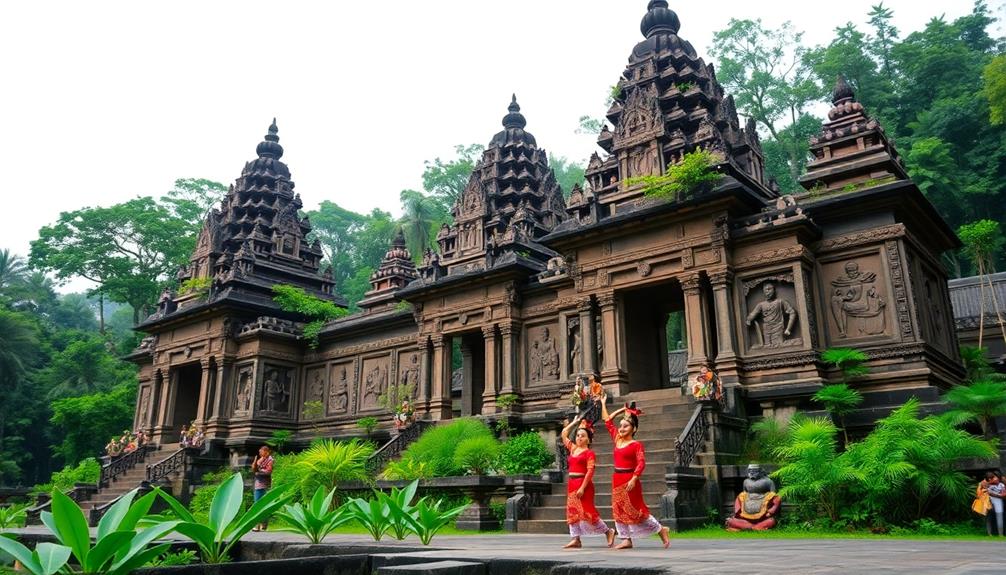
As you explore Indonesia's historical significance, you'll notice how colonial influences have shaped its culture, traditional practices, and artistic expressions. The remnants of this rich past are evident in the country's historic sites and landmarks, each telling a unique story.
Additionally, the architectural styles, including traditional houses like Rumah Adat, reflect the diverse cultural heritage that has been preserved over time. Understanding these elements will deepen your appreciation for Indonesia's diverse legacy.
Colonial Influences on Culture
Indonesia's cultural landscape reflects a complex history shaped by over 300 years of Dutch colonization. This period left a significant mark, intertwining indigenous traditions with colonial influences on culture that resonate today.
You'll notice this blend in various aspects of Indonesian life, from the arts and architecture to the diverse culinary offerings, as seen in unique Indonesian wedding decor ideas that highlight both tradition and modernity.
The introduction of Christianity and Western education during the colonial era played a pivotal role in molding modern Indonesian society. As you explore major cities, you'll see how colonial legacies manifest through urban planning and infrastructure, where European architectural styles sit alongside local designs.
This coexistence tells a story of adaptation and resilience.
The struggle for independence, ignited in the early 20th century and culminating in 1945, was driven by a desire to reclaim cultural identity and sovereignty from colonial rule.
This quest not only emphasized the importance of local traditions but also aimed to redefine what it means to be Indonesian. By understanding these colonial influences on culture, you gain insight into the rich tapestry of Indonesia's heritage and the ongoing journey of its people. As we delved deeper into the historical significance of certain cultural practices, we also discovered new sources of home decor inspiration. The intricate designs and vibrant colors of traditional Indonesian textiles and crafts have brought a fresh perspective to our interior design choices. Incorporating these elements into our homes allows us to connect with the essence of Indonesian culture and pay homage to its enduring legacy.
Traditional Practices and Artifacts
Steeped in rich traditions, Indonesia showcases a vibrant array of practices and artifacts that reveal its historical significance and legacy. One of the most renowned traditional practices is Batik textile art, celebrated for its intricate designs and recognized as a UNESCO Intangible Cultural Heritage. This art form reflects the diverse cultural narratives woven into Indonesian society, much like the intricate designs found in Indonesian decor masks that embody cultural stories.
In addition to textiles, the island of Pulau Samosir holds historical importance, once home to the Batak people, who are known for their warm hospitality and unique cultural heritage. You can also find traditional artifacts like ancestral trophies from head-hunting practices in some regions, offering a glimpse into the customs of various tribes.
Moreover, the Rafflesia arnoldii, or corpse lily, stands out as the world's largest flower and holds cultural significance, symbolizing Indonesia's rich biodiversity.
Traditional ceremonies, such as Bali's Ngaben cremation ceremony, further emphasize the deep-rooted spiritual beliefs and cultural practices passed down through generations. Together, these traditional practices and artifacts not only showcase Indonesia's vibrant heritage but also highlight the profound connections between its people and their history.
Historic Sites and Landmarks
What makes Indonesia a treasure trove of history? You'll find it's brimming with historic sites that reflect its rich cultural legacy. One of the most remarkable is the Borobudur Temple, the world's largest Buddhist temple. This UNESCO World Heritage Site showcases intricate carvings and a stunning architectural design that narrates the story of Buddhism in the region.
The local architecture also often incorporates natural materials and reflects harmony with nature, enhancing the cultural significance of these landmarks, much like the traditional Indonesian style home decor.
In Yogyakarta, you can explore the Sultan's Palace, a symbol of Javanese culture and politics. This ancient city serves as a living testimony to Indonesia's royal heritage.
The influence of the Majapahit Empire, one of Southeast Asia's greatest empires, is also evident here, shaping trade and culture from the 13th to 16th centuries.
Don't forget the spice islands of Maluku, where the remnants of ancient trade routes reveal Indonesia's pivotal role in global commerce during the Age of Exploration.
Additionally, in cities like Jakarta, the architecture reflects the Dutch colonial period, blending European styles with indigenous elements.
These historic sites and landmarks not only tell Indonesia's story but also connect you to its vibrant past, making every visit a journey through time.
Culinary Diversity and Flavors
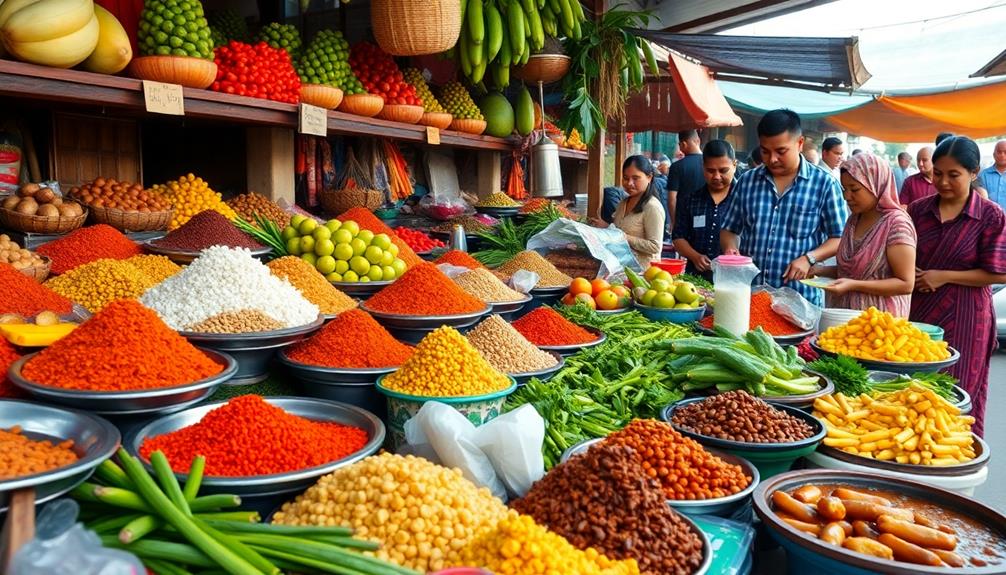
Culinary diversity in Indonesia is nothing short of remarkable, boasting over 5,000 traditional recipes that showcase the country's rich cultural heritage. Each region brings its unique flair, with local ingredients and cooking techniques shaping the flavors you'll discover.
Rice serves as a staple, often enjoyed daily alongside mouthwatering dishes like Nasi Goreng (fried rice) and Rendang (spicy meat stew).
Indonesian cooking is a vibrant tapestry of spices and herbs, where ingredients like chili, turmeric, and lemongrass play starring roles in enhancing flavors. This culinary diversity not only reflects the nation's history but also its geographical richness.
Street food culture thrives here, offering a delightful array of affordable and delicious options. As you stroll through bustling markets, you'll find tempting snacks like Satay (grilled skewered meat) and Gado-Gado (vegetable salad with peanut sauce), each bite telling a story of local traditions.
With each island presenting its unique specialties, Indonesian cuisine becomes an ever-evolving landscape of tastes and aromas, inviting you to explore and savor the country's delicious heritage.
Natural Wonders and Landscapes
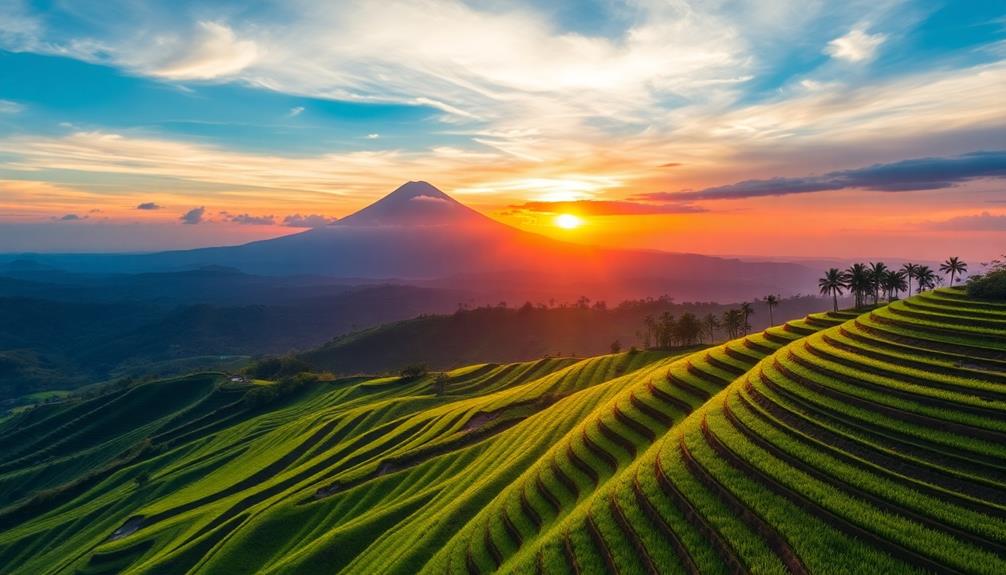
Indonesia's breathtaking landscapes are as diverse as its culinary offerings. This archipelago boasts a wealth of natural wonders that will leave you in awe. For instance, Lake Toba is the world's largest natural volcanic lake, measuring about 500 meters deep and 100 kilometers long, formed from a massive eruption around 70,000 years ago.
You can also explore Puncak Jaya, the tallest island peak at 4,884 meters, where its snow-capped summit offers stunning views. With over 10% of the world's plant species and 12% of mammal species, Indonesia is one of the richest biodiversity hotspots globally.
Take a look at the table below to discover more about Indonesia's natural wonders:
| Natural Wonder | Description | Location |
|---|---|---|
| Lake Toba | Largest volcanic lake, 500m deep | Sumatra |
| Puncak Jaya | Tallest peak with snow-capped summit | Papua Province |
| Rafflesia arnoldii | Largest flower, up to 3 feet in diameter | Rainforests |
| Active Volcanoes | 130 active volcanoes across the islands | Various |
These natural wonders make Indonesia a must-visit destination for nature lovers.
Social Interactions and Traditions
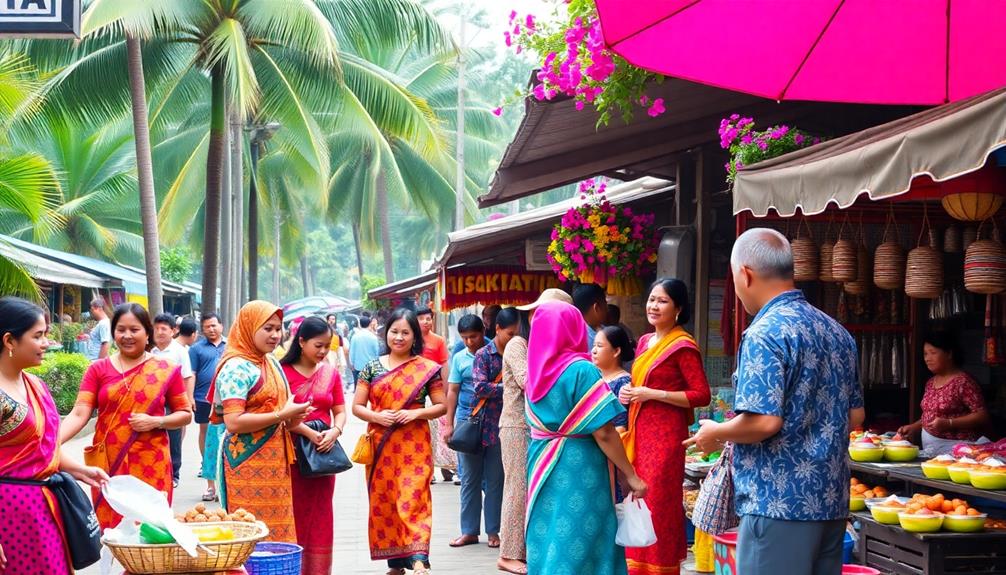
Social gatherings are at the heart of Indonesian culture, reflecting the deep-rooted value placed on companionship and strong social bonds. You'll find that togetherness is key in their way of life; Indonesians prioritize community activities that foster connections.
From family reunions to neighborhood celebrations, these social gatherings strengthen relationships and create lasting memories.
In these interactions, humor plays a crucial role. You'll often hear laughter and light-hearted jokes exchanged among friends, enhancing the enjoyment of conversations. This friendly atmosphere encourages relaxed and easy-going interactions, making it easy to connect with others.
Family ties are especially important, with many activities revolving around loved ones. You'll notice that communal gatherings not only celebrate milestones but also reinforce family bonds.
This cultural emphasis on togetherness guarantees that friendships flourish through shared experiences.
When you greet an Indonesian, expect a warm smile. This simple gesture promotes a welcoming environment, inviting deeper conversations and connections.
In Indonesia, social gatherings aren't just events; they're fundamental to building a cohesive society, where every relationship contributes to a rich tapestry of shared life experiences.
Tourism and Travel Attractions
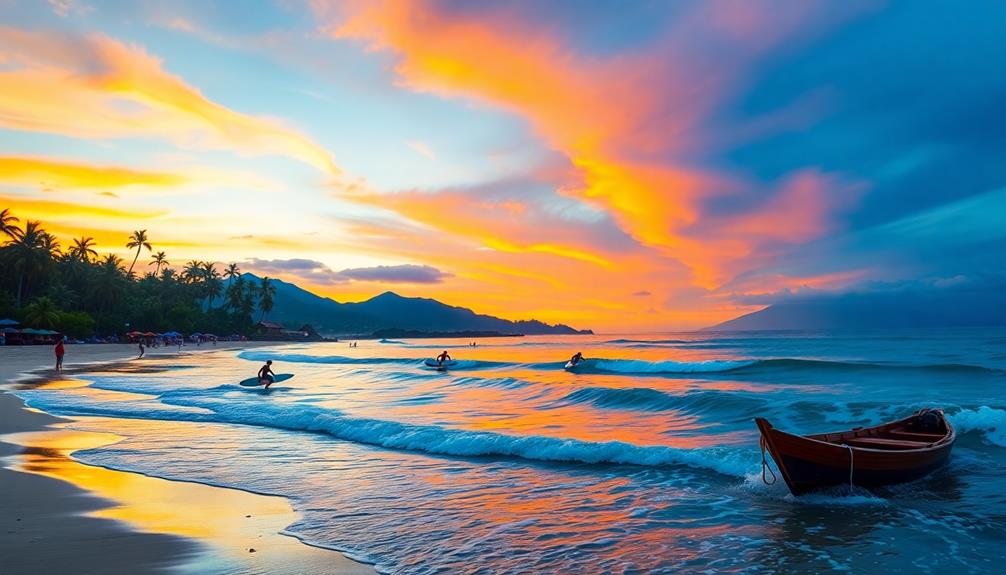
Every year, millions of travelers flock to Indonesia, drawn by its breathtaking landscapes and rich cultural experiences. With around 16 million international visitors annually, Indonesia is a top destination for those seeking diverse adventures.
Here are three key attractions you shouldn't miss:
- Bali: Known for its stunning beaches and vibrant culture, Bali offers relaxation and adventure, making it a must-visit for anyone traveling to Indonesia.
- UNESCO World Heritage Sites: Explore iconic sites like Borobudur Temple and Komodo National Park, which showcase Indonesia's rich cultural heritage and natural beauty.
- Jakarta: As the most geotagged city in Asia on Instagram, Jakarta attracts social media-savvy tourists enthusiastic to capture its vibrant urban life.
In addition, ecotourism initiatives in places like Raja Ampat and Borneo promote sustainable travel while allowing you to discover Indonesia's rich biodiversity and pristine landscapes.
Whether you're looking for relaxation, adventure, or cultural immersion, Indonesia's tourism scene offers something for everyone, ensuring an unforgettable experience.
Immerse yourself in the beauty and diversity that this incredible country has to offer!
Frequently Asked Questions
What Are Indonesia's Interesting Facts?
You'll find Indonesia fascinating with its 17,000 islands, over 270 million people, and rich biodiversity. You'll discover unique wildlife, active volcanoes, and a diverse culinary scene that highlights regional dishes and rice as a staple.
What Are Indonesians Most Known For?
When you think of Indonesia, imagine vibrant cultures and stunning landscapes coexisting. You'll discover rich culinary traditions, breathtaking biodiversity, and a passionate badminton scene. It's a place where nature and culture harmoniously thrive together.
What Is Indonesia Special For?
Indonesia's special for its stunning biodiversity, vibrant cuisine, and rich cultural heritage. You'll discover breathtaking natural wonders and experience a unique blend of traditions, languages, and warm hospitality that truly sets it apart from other nations.
What Are Some Interesting Facts About Java Indonesia?
Did you know Java's home to over 150 million people? It's rich in culture, boasting stunning volcanoes like Mount Bromo, and offers diverse wildlife in national parks, making it an adventurous destination for you!
Conclusion
In discovering Indonesia, you'll delight in a dazzling display of diversity—breathtaking biodiversity, vibrant cultures, and tantalizing tastes. You'll uncover a land where historical heritage harmonizes with hopeful economic horizons. From stunning landscapes to spirited social interactions, every corner offers a fascinating encounter. So, whether you're savoring scrumptious street food or exploring exotic environments, Indonesia invites you to immerse yourself in its rich tapestry and create unforgettable memories. Embrace the enchanting essence of this incredible archipelago!

